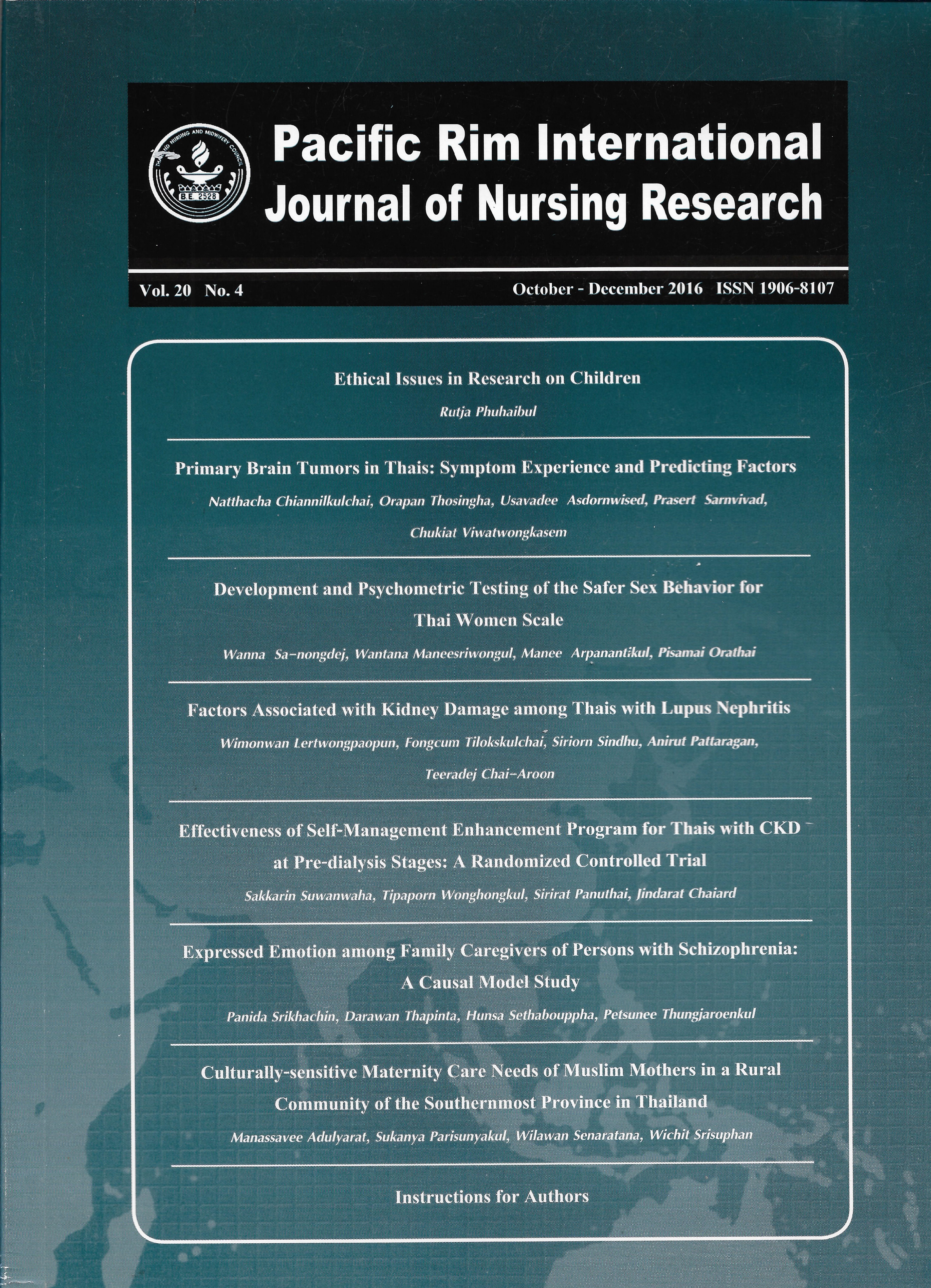Ethical Issues in Research on Children
References
1. Sueblinvong T., Morakot N., Panichkul S. Ethical Guidelines for Research in Children. Bangkok: Chula Book; 2015. (in Thai).
2. Tsuchiya T. In the shadow of the past atrocities: Research ethics with human subjects in contemporary Japan. Journal of Asian and International Bioethics. 2003; 13: 100-2.
3. Lifton RJ. The Nazi Doctors: Medical Killing and the Psychology of Genocide. New York: Basic Books; 1986.
4. Kubica H. The Crimes of Josef Mengele. In Gutman I., Yisrael M., Berenbaum M. Anatomy of the Auschwitz Death Camp. Bloomington, Indiana: Indiana University Press; 1998.
5. Einarsdóttir J. Research with children: methodological and ethical challenges. European Early Childhood Education Research Journal. 2007. 15(2): 197-210.
6. Draft Research on Human Subjects Law. Thailand Citation Index Centre. No date. [Cited 2016 Jul 1]. Available from https://tcijthai.com/tcijthainews/view.php?ids=5428. (in Thai)
7. World Medical Association. Declaration of Helsinki. Ethical Principles of Medical Research Involving Health Subjects. Amended 2013; c2013. [Cited 2016 Jul 1]. Available from https://www.wma.net/en/30publication/10policies/ b3/index.html.pdf?
8. The National Commission for the Protection of Human Subjects on Biomedical & Behavioral Research. The Belmont Report. No date. [Cited 2016 Jul 8]. Available fromhttps://videocast.nih.gov/pdf/ohrp_appendix_belmont_report_ vol_2.pdf
9. Thomas N., O’Kane C. The ethics of participatory research with children. Children & Society. 1998. 12: 336-48.
10. UCLA OHRPP. Guidance and procedures: Child assent and permission by parents or guardians. Available from http//:ora.research.ucla.edu/OHRPP/Documents/ChildAssent_ParentPerm.pdf?
11. Faculty of Medicine Siriraj Hospital, Mahidol University. Assent form for children. No date [Cited 2016 Jul 1]. Available from https://www.google.co.th/search?q+assent&ie=utf-8&oe=utf-8&gws_rd=cr&ei=eD0pV_j2LoKeuQSE8a OoDg. (in Thai).
12. Shaddy RE., Denne SD. the Committee on Drugs and Committee on Pediatric Research. Guidelines for ethical conduct of studies to evaluate drugs in pediatric populations. Pediatrics. 2010; 125(4): 850-60.
13. Howie SR. Blood sample volumes in child health research: review of safe limits. Bulletin, WHO. 2011; 89(1): 46-53.
14. National Research Council. The Ethical Conduct of Clinical Research involving Children. Washington DC: The National Academic Press; 2004.
15. Nuffield Council on Bioethics. Involving Children and Young People in Health Research-Getting it Right. No date. [Cited 2016 Jul 1]. Available at: www.nuffieldbioethics.org/children.
2. Tsuchiya T. In the shadow of the past atrocities: Research ethics with human subjects in contemporary Japan. Journal of Asian and International Bioethics. 2003; 13: 100-2.
3. Lifton RJ. The Nazi Doctors: Medical Killing and the Psychology of Genocide. New York: Basic Books; 1986.
4. Kubica H. The Crimes of Josef Mengele. In Gutman I., Yisrael M., Berenbaum M. Anatomy of the Auschwitz Death Camp. Bloomington, Indiana: Indiana University Press; 1998.
5. Einarsdóttir J. Research with children: methodological and ethical challenges. European Early Childhood Education Research Journal. 2007. 15(2): 197-210.
6. Draft Research on Human Subjects Law. Thailand Citation Index Centre. No date. [Cited 2016 Jul 1]. Available from https://tcijthai.com/tcijthainews/view.php?ids=5428. (in Thai)
7. World Medical Association. Declaration of Helsinki. Ethical Principles of Medical Research Involving Health Subjects. Amended 2013; c2013. [Cited 2016 Jul 1]. Available from https://www.wma.net/en/30publication/10policies/ b3/index.html.pdf?
8. The National Commission for the Protection of Human Subjects on Biomedical & Behavioral Research. The Belmont Report. No date. [Cited 2016 Jul 8]. Available fromhttps://videocast.nih.gov/pdf/ohrp_appendix_belmont_report_ vol_2.pdf
9. Thomas N., O’Kane C. The ethics of participatory research with children. Children & Society. 1998. 12: 336-48.
10. UCLA OHRPP. Guidance and procedures: Child assent and permission by parents or guardians. Available from http//:ora.research.ucla.edu/OHRPP/Documents/ChildAssent_ParentPerm.pdf?
11. Faculty of Medicine Siriraj Hospital, Mahidol University. Assent form for children. No date [Cited 2016 Jul 1]. Available from https://www.google.co.th/search?q+assent&ie=utf-8&oe=utf-8&gws_rd=cr&ei=eD0pV_j2LoKeuQSE8a OoDg. (in Thai).
12. Shaddy RE., Denne SD. the Committee on Drugs and Committee on Pediatric Research. Guidelines for ethical conduct of studies to evaluate drugs in pediatric populations. Pediatrics. 2010; 125(4): 850-60.
13. Howie SR. Blood sample volumes in child health research: review of safe limits. Bulletin, WHO. 2011; 89(1): 46-53.
14. National Research Council. The Ethical Conduct of Clinical Research involving Children. Washington DC: The National Academic Press; 2004.
15. Nuffield Council on Bioethics. Involving Children and Young People in Health Research-Getting it Right. No date. [Cited 2016 Jul 1]. Available at: www.nuffieldbioethics.org/children.
Downloads
Published
2016-10-31
How to Cite
1.
Phuphaibul R. Ethical Issues in Research on Children. PRIJNR [internet]. 2016 Oct. 31 [cited 2026 Mar. 1];20(4):271-4. available from: https://he02.tci-thaijo.org/index.php/PRIJNR/article/view/58088
Issue
Section
Editorial
License
Copyright: The Pacific Rim International Journal of Nursing Research, Thailand Nursing & Midwifery Council has exclusive rights to publish, reproduce and distribute the manuscript and all contents therein.








.png)



